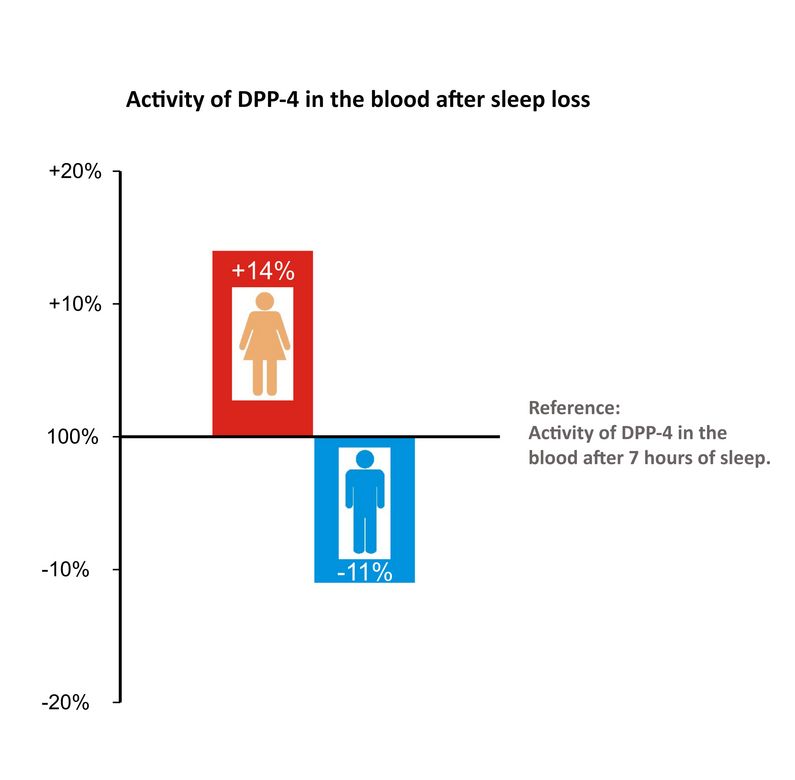15.12.2017
Sleep loss affects the production of the enzyme DPP-4 in women and men differently
After a night without sleep, women form more DPP-41, an enzyme that promotes obesity, fatty liver disease and insulin resistance. In men, on the other hand, the morning activity of the enzyme decreases when they do not sleep enough. This is shown by a recent study by the Uppsala University, Sweden, and the German Institute of Human Nutrition (DIfE), a partner of the German Center for Diabetes Research (DZD). The findings are published in Diabetes Care (DOI: https://doi.org/10.2337/dc17-1762).
Recent studies from the DIfE have shown that an increased production of the enzyme DPP-4 by the liver promotes an increase in body fat, the development of fatty liver disease and insulin resistance. DPP-4 for instance inactivates gut hormones that help lower blood sugar and promote satiety after food intake (e.g. GLP-1). Noteworthy, similar adverse effects on metabolic health have been described for poor sleep. However, as of yet, no study has investigated whether sleep loss affects the activity of circulating DPP-4. Thus, researchers from the DIfE and Uppsala University, Sweden, measured the activity of DDP-4 in blood in 25 young adults (13 women and 12 men) in the morning after a full night of sleep loss or normal sleep (7 hours+). “Activity of circulating DPP-4 increased by about 14% in women, whereas it decreased by about 11% in men following sleep loss. The increase in DPP-4 activity seen in women following sleep loss may be of clinical concern”, says Christian Benedict senior author of the study and from the Department of Neuroscience, Uppsala University, Sweden. Previous studies have shown that DPP-4 increases the uptake of fatty acids into the liver, thereby promoting fat deposition in this organ. Moreover, it reduces blood concentration of gut hormones promoting satiety. Although reduced DPP-4 could be seen as a favorable metabolic response of men to sleep loss, it must be noted that chronic poor sleep patterns increase the risk of developing metabolic diseases (e.g. obesity) in both sexes.” says Heike Vogel, co-senior author of the study and from the Department of Experimental Diabetology at DIfE. The authors suspect that lack of sleep in men and women can lead to a metabolic disease in different ways.The findings are published in Diabetes Care.
Publication:
Frida H. Rångtell, Felix Schmidt, Josefine Würfel, Swathy Karamchedu, Peter Andersson, Heike Vogel, Christian Benedict: Morning enzymatic activity of DPP-4 is differentially altered by sleep loss in women and in men, Diabetes Care. 2017 Dec 4. pii: dc171762.
DOI: https://doi.org/10.2337/dc17-1762
http://care.diabetesjournals.org/content/early/2017/11/30/dc17-1762.long
For further information, please contact:
Heike Vogel,
Department of Experimental Diabetology,
German Institute of Human Nutrition Potsdam-Rehbruecke, Nuthetal, Germany
Phone: +49 33 200 88 45 45
E-Mail: heikevogel@dife.de
Christian Benedict
Department of Neuroscience
Uppsala University
Institutionen för neurovetenskap
BMC, Box 593
751 24 UPPSALA
Phone: +4618-471 4326
E-Mail: Christian.Benedict@neuro.uu.se
1DPP-4 is the acronym for dipeptidyl peptidase 4. The enzyme cleaves, among others, some intestinal hormones (incretins) glucagon-like peptide-1 (GLP-1) and gastric inhibitory polypeptides (GIP), which as a result lose their effectiveness. This leads to high blood glucose values; the function of the insulin-producing cells in the pancreas is also negatively influenced. DPP-4 inhibitors are already used as a drug in the treatment of diabetes in order to prolong the effect of the two endogenous incretins GLP-1 and GIP. Their aim is to increase insulin secretion after food intake in people with type 2 diabetes.
Press contact

Birgit Niesing
niesing(at)dzd-ev.de
+49 (0)89 3187-3971
 |
